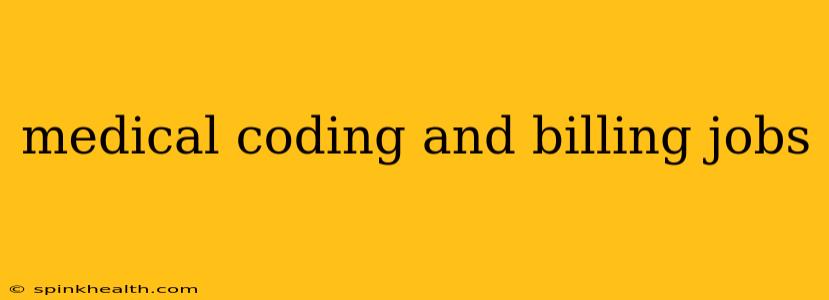Decoding the Thriving World of Medical Coding and Billing Jobs
The world of healthcare is vast and complex, but behind the scenes, ensuring smooth operations and accurate financial records is a critical team: medical coders and billers. These professionals are the unsung heroes, translating medical jargon into numerical codes that insurance companies understand and ensuring healthcare providers receive timely reimbursements. If you're curious about a career in this field, let's dive into the intricacies of medical coding and billing jobs, exploring the different roles, necessary skills, and the rewarding aspects of this dynamic profession.
My name is Sarah, and I've worked in medical billing for over 10 years. I’ve seen firsthand the dedication and expertise required in this field and the impact it has on both patients and healthcare providers. This journey will be guided by my experience, drawing on real-world insights to paint a clearer picture of this essential career path.
What Does a Medical Coder Do?
Imagine being a translator, but instead of languages, you translate medical terms and procedures into standardized codes. That's essentially the role of a medical coder. They meticulously review patient medical records—doctor's notes, lab results, diagnostic images—and assign specific codes based on established coding systems like ICD-10 (International Classification of Diseases, 10th Revision) for diagnoses and CPT (Current Procedural Terminology) for procedures. Accuracy is paramount, as incorrect coding can lead to denied claims and financial losses for healthcare providers.
What Does a Medical Biller Do?
Medical billers take the coded information from the coders and create and submit claims to insurance companies. They navigate the complex world of insurance policies, payer requirements, and billing protocols. This involves understanding different insurance plans, processing claims electronically, following up on denials, and managing patient accounts. Think of them as the financial navigators ensuring healthcare providers get paid for the services they provide.
What are the differences between medical coding and billing?
This is a common question. While both roles are crucial, they have distinct functions. Coders focus on translating medical information into codes, while billers focus on submitting those codes to insurance companies to secure payment. Often, professionals will work in either role exclusively, or in larger facilities, they may find themselves handling both. The crucial point is that both are integral to the smooth financial functioning of a healthcare facility.
What skills are needed for medical coding and billing jobs?
Success in this field demands a strong blend of technical and interpersonal skills. Attention to detail is paramount, as even a small error in coding can have significant consequences. Strong analytical abilities are essential for interpreting medical records and identifying the correct codes. Furthermore, proficiency in medical terminology and anatomy is a must, along with a solid understanding of insurance procedures and billing practices. Excellent communication skills are also necessary for interacting with physicians, insurance representatives, and patients. Finally, a knack for problem-solving and the ability to manage multiple tasks are crucial, especially for those handling both coding and billing functions.
What type of education or certification is required?
While a college degree isn't always mandatory, obtaining a formal education and certification significantly enhances your career prospects. Many community colleges and vocational schools offer comprehensive programs in medical coding and billing. Certified professionals are highly sought after, with certifications like the Certified Professional Coder (CPC) and Certified Professional Biller (CPB) adding considerable weight to your resume.
What is the job outlook for medical coding and billing specialists?
The job outlook for medical coding and billing specialists is generally positive. The healthcare industry continues to expand, driving demand for these professionals. The aging population and advancements in medical technology further contribute to the need for accurate coding and billing to manage the increasing complexity of healthcare claims processing.
What is the salary range for these positions?
Salaries for medical coders and billers vary depending on experience, location, and employer. Entry-level positions typically offer competitive starting salaries, while experienced professionals can command significantly higher compensation.
This journey into the world of medical coding and billing jobs has hopefully provided a clearer understanding of the roles, skills, education, and prospects within this vital healthcare sector. It's a field that blends technical precision with a commitment to ensuring patients receive the care they need while also safeguarding the financial health of healthcare providers. If you’re detail-oriented, analytical, and enjoy problem-solving, this could be the perfect career path for you. Remember, accuracy and thoroughness are key to success in this field.

